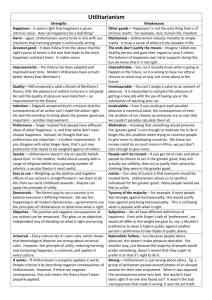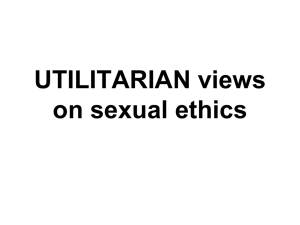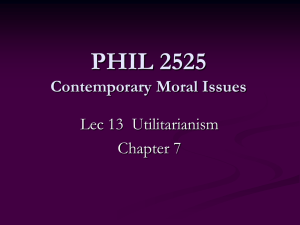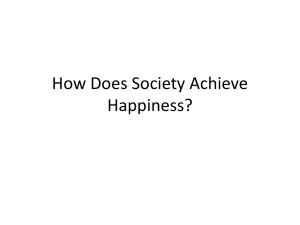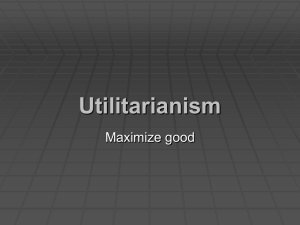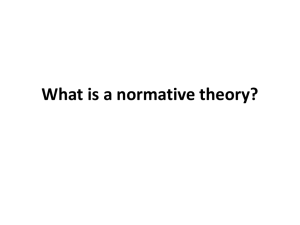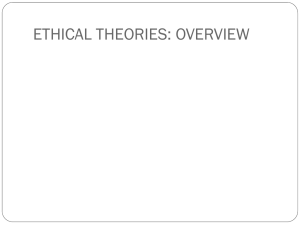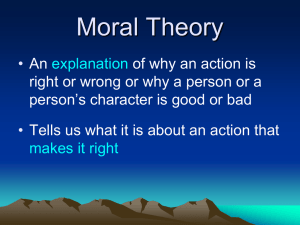Utilitarianism-R-Warren-041014
advertisement
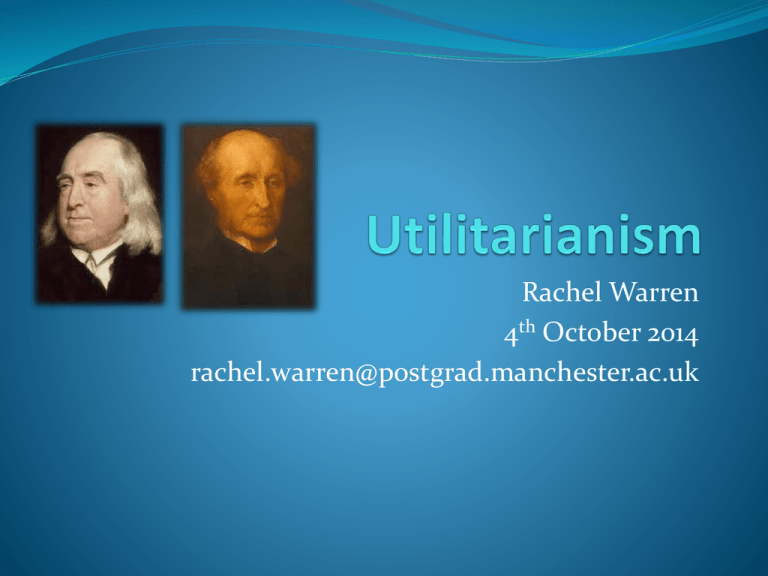
Rachel Warren 4th October 2014 rachel.warren@postgrad.manchester.ac.uk Session Aims: To introduce the distinct features of utilitarianism as a form of consequentialism. To examine the application of utilitarian thinking to some ethical problems in health care. To identify some key strengths and weaknesses of utilitarianism in this context. Issues: The ‘classical’ utilitarianism of Bentham and J.S. Mill. Principle strengths and weaknesses of utilitarianism. The difference between act and rule utilitarianism. Are there limits to what utilitarians would do – how far can the ends justify the means? Key claims of Utilitarianism: An action is to be judged right or wrong solely by virtue of its consequences. 2. In assessing consequences, only the balance of happiness/unhappiness (of all) matters. 3. Each person’s happiness counts equally. 1. From Rachels. Utilitarianism Right Action Good Pleasure (Hedonism) Classical Utilitarianism 18-19th C: Bentham and Mill. One Moral Principle: Principle of Utility: ‘Always act so as to bring about the greatest happiness of the greatest number’. Utility as happiness. Morally, only the consequences of an action matter. Maximise happiness. Happiness as pleasure(Bentham). 20th C: Desire satisfaction/Preference Satisfaction accounts of happiness. Key Definition: Mill: ‘Utility, or the Greatest Happiness Principle, holds that actions are right in proportion as they tend to promote happiness, wrong as they tend to produce the reverse of happiness. By happiness is intended pleasure, and the absence of pain; by unhappiness, pain, and the privation of pleasure’. p.210 Classical Utilitarianism 2 How to calculate which action will produce the most happiness? -> Felicific Calculus. Calculate net happiness of consequences, including unhappiness (suffering) which may occur. The demands of Utilitarianism: Too much? Impartiality over moral proximity. ‘Each counts for one and no one for more than one’ ‘The question is not can they reason? Nor can they talk? But, can they suffer?’ Too little? Conflict with justice? Morally counter-intuitive conclusions? Questions: Are consequences all that matters? How is the notion of happiness to be defined? Is pleasure the only thing that matters? Should we be equally concerned for everyone? How to weigh theory vs. intuitions? Begin to think about evaluation... Higher and Lower Pleasures Mill’s development of Bentham’s theory: a reply to the charge that utilitarianism is ‘a doctrine worthy only of swine’. Preference for ‘higher’ pleasures over ‘lower’ pleasures by competent judges: “It is better to be a human being dissatisfied than a pig satisfied; better to be Socrates dissatisfied than a fool satisfied”. How could this idea affect treatment choices? Refining Utilitarianism Act Utilitarianism Rule Utilitarianism Always act so as to Always do the action produce the greatest happiness of the greatest number. which conforms to a rule, the general acceptance of which would produce greater happiness than any other alternative. Q: Does Act utilitarianism really need to be modified, even if it challenges common sense assumptions? Case Study 1: Immunisation See Pippa handout. Discuss in small groups and feed back. Johnston, C and Bradbury P 2008: 100 Cases in Clinical Ethics and Law. London, Hodder Arnold. PP. 5-6.. The Survival Lottery Would the SL be a better proposal if: a) suicidal people were permitted to volunteer as organ donors? b) it worked on an ‘opt-out’ basis (those that opt out of donating cannot receive organs). c) the scheme was purely ‘opt-in’ (so only those that opt in to donate can receive organs). Other Applications to Medicine: E.g: QALY’s Public health Sentience (ability to feel pleasure and pain) and Moral Status: implications for the treatment of foetuses, PVS patients, anencephalic babies. Impartiality, future generations and resource allocation. Medical Goal to minimise pain and suffering. Strengths: Weaknesses: 21 Evaluating Utilitarianism Strengths Weaknesses Intuitive Problem with accurately Simplicity Impartial Universal Pettit: ‘What non consequentialists find persuasive is something which consequentialists are able to understand, and undermine’. ascertaining consequences. Gap between foreseen, predicted consequences and actual consequences. Does not allow for moral proximity May justify atrocities in the name of the greater good. Moral paralysis – lack of spontaneity. Consequences are not the only morally relevant thing. Q: Are there limits to what Utilitarians would do? How far can the ends justify the means? Objections and Replies Critical Counter Arguments: Conflict with Justice: McCloskey’s Lynch Mob Does not recognise rights Excludes backward-looking reasons Too demanding Disrupts personal relationships – requirement of impartiality. Defence of Utilitarianism Replies: Denying the Consequences would be good (in c-e t.e.’s) Utility as a guide for Rules, not Acts. ‘Common sense’ is wrong All values have a util. basis. Crit. view that some values are independent of utility Q. Gut reaction to exceptional cases Focus on all conseqs. Summary: Key Concepts in utilitarianism. Application to cases in medicine. Evaluation: strengths and weaknesses of utilitarianism. Summary: • The morally correct thing to do is that that results in the best • • • • • • overall outcome; irrespective of the means used to achieve those consequences. The principle of utility: the greatest happiness principle. Right: “the greatest happiness for the greatest number” (Bentham). Good: Happiness: maximising pleasure and minimising pain. Difficulties with accurately ascertaining consequences, hence appeal to Rules. No absolute prohibitions: ‘nothing unthinkable’ if it creates the most happiness for the majority. Mill’s distinction between Higher and Lower order pleasures. Further Reading: rachel.warren@postgrad.manchester.ac.uk 28
